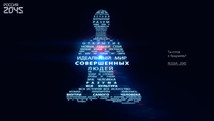/ Фото конкурс
/ experts
- Ph.D. in Physical and Mathematical Sciences, Senior Researcher of the Heat-Resistant Thermoplastics Laboratory at ISPM (Russian Academy of Sciences), creator of nanosensor neurologic ‘Electronic nose’ system
 Mikhail Y.
Mikhail Y.
YABLOKOV‘When creating an artificial human, we need to add an emotional trend to the predominant robotics one. It’s an all-inclusive idea, and it’s in the air...’
- Ph.D. in Biology, Head of the Neurophysiology and Neural Interfaces Lab at the Russian State University Biology Department (MGU)
 Professor Alexander Y.
Professor Alexander Y.
KAPLAN‘By the time sustaining a brain artificially becomes possible, bio-robots will have been perfected to the point of looking like a decent human body...’
- Ph.D. in Medicine, Head of the Cells and Tissues Growth Laboratory of Theoretical and Experimental Biophysics (Russian Academy of Sciences)
 Professor Boris K.
Professor Boris K.
GAVRILYUK“For skin on a cyborg, you simply need to create a nutrition system. And basically . . . we are not really complex in design! There are only a few systems: the circulatory system carries oxygen and nutrients; the excretory system extirpates the waste. The rest is end-effectors. To begin we can create a very simple living organism—then, later, more complex systems. . . .”
- Doctor of physics and mathematics, Head of the Department of Neuroinformatics at the Center for Optical Neural Technologies of the Scientific Research Institute for System Analysis of the Russian Academy of Sciences
 Witali L.
Witali L.
Dunin-Barkowski' If the job is to be taken seriously, we can get a detailed model of a brain prototype within five years or so. And since many research areas concerned with the subject develop in parallel, it may well be that we can achieve these results even faster...'
- Ph.D. in Biology, Inventor of the "Bioartificial liver" device
 Professor Vyacheslav Y.
Professor Vyacheslav Y.
RYABININ - Head of the Space Technology and Telecommunications Cluster at the Skolkovo
 Sergey
Sergey
Jukov"I am absolutely convinced that the movement “2045’ happened exactly at the right time and the right place as I believe in the great future for Russia, in her success after temporary difficulties".
- Artist, art theorist, Curator of the National Center of Contemporary Arts (Kaliningrad branch)
 Dmitry H.
Dmitry H.
BULATOV‘In the near future, hybrid combinations of living and nonliving elements will help to recover lost or missing original features. And of course, greatly enhance them in comparison to the usual ones...’
- President of Neyrobotiks
 Vladimir A.
Vladimir A.
KONYSHEV‘The transfer of the brain into an artificial body, more enduring, more perfect, is the only way the human race to stay on Earth...’
- Ph.D. in Chemistry, Head of the Chemical Enzymology Department at the Moscow State University, corresponding member of the Russian Academy of Sciences, Director of the Institute of Biochemical Physics (Russian Academy of Sciences)
 Professor Sergey V.
Professor Sergey V.
VARFOLOMEEV‘An electronic version of the brain is needed. The physical brain, in my opinion, can not be a subject of study, since it is very subtle. But an electronic analog having all the receptor equipment and the same story, incentives, motivation - it might be very interesting...’
- Ph.D. in Biology, Head of the Lipid Metabolism Laboratory at the Russian Institute of Gerontological Research and Development
 Elena V.
Elena V.
TERIOSHINA‘There is nothing to be afraid of. The project of creating a carrier of an immortal brain is of extreme importance. Nature definitely creates talented, brilliant, genius people – but they are mortal. Mankind creates books and imparts knowledge to descendants. But imagine a genius working eternally!’
- Ph.D. in Technical Sciences
 Professor Aleksandr A.
Professor Aleksandr A.
BOLONKIN‘An artificial mechanical body will have great power and withstand extreme environmental conditions: high temperature, pressure, radiation, space...’
- Professor at the University of Southern Maine, co-chairman of GF2045
 Barry
Barry
Rodrigue"While innovation is often presented as a technological process, it also needs to be applied everywhere and to everything. We need innovation in human affairs, from family relations to business affairs. Innovation has to address both ecological balance of species and destruction of inorganic habitats. Alternatives must be found for warfare and the arms industry. In short, innovation is a process that applies to all existence..."







 LinkedIn
LinkedIn
 LiveJournal
LiveJournal
 Google
Google
 Twitter
Twitter
 Facebook
Facebook
 Я.ру
Я.ру
 ВКонтакте
ВКонтакте
 Mail.ru
Mail.ru